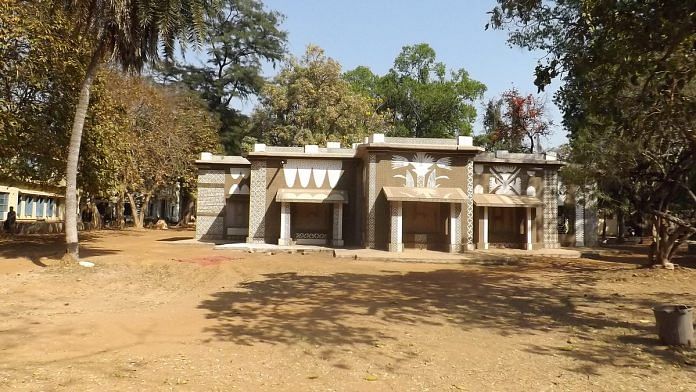Santiniketan literally means the abode of peace. It is where Rabindranath Tagore lived and founded a central university. Now, Santiniketan has been added to the list of World Heritage sites by UNESCO.
The central government had first tried to get the World Heritage tag for Santiniketan in 2010. It mounted its campaign again in 2021, with a fresh dossier prepared by the Archaeological Survey of India in collaboration with Visva-Bharati university authorities and submitted to UNESCO, Hindustan Times had reported.
But today, West Bengal’s TMC-BJP politics has hurt what was once a great institution. Visva-Bharati, a name given by Tagore himself, which means the communion of the world with India, has become one of the battlegrounds for the control of the Bengali minds and votes between the Bharatiya Janata Party (BJP) and the Trinamool Congress (TMC). Moreover, there have been reports that drugs and prostitution have cast a shadow on the legacy of Tagore’s town.
Amartya Sen’s Pratichi
Amartya Sen, the winner of 1998 Nobel Prize in Economics was born in Santiniketan, where he completed his school education. His name ‘Amartya’ was given by Tagore. It is no surprise that Sen, who has a house in Massachusetts, US and another one in Cambridge, England, prefers to spend his winters at his Santiniketan home. There, he likes to spend his days reading books and arguing with people. Maybe it is the spirit of these arguments that helped him write his book of essays, The Argumentative Indian, in 2005.
But if he fails to argue his case, Sen may well lose his home to the Visva-Bharati. The university has alleged that Sen’s house in Santiniketan illegally occupies its land. The controversy revolves around a 99-year lease given to eminent persons since Tagore’s time on Visva-Bharati campus. Sen’s father, Ashutosh Sen, who was a professor at the university, had built the house, Pratichi, on the land he got on lease like many others did.
In 2022, the university’s vice-chancellor, Bidyut Chakrabarty, claimed that Sen’s father had rented only 1.25 acres of land on a lease in 1943 and the remaining 0.13 decimal is being illegally occupied by Sens. Visva-Bharati sent three letters to Sen since 24 January 2022 and then issued an eviction notice on 17 March, Hindustan Times reported.
West Bengal Chief Minister Mamata Banerjee has thrown her weight behind Sen. On 30 January this year, Banerjee visited Sen at his Santiniketan home and handed him a document according to which the entire 1.38 decimal covered by the property belongs to him. The university has challenged the document.
At the core of this controversy is a fight between the BJP and the TMC. Being a central university, the governor of West Bengal is the rector of Visva-Bharati, the prime minister acts as its chancellor and the president appoints the vice-chancellor of the university.
It is no secret that Sen is critical of Prime Minister Narendra Modi. In an interview to Karan Thapar for The Wire, Sen had said, “The Modi government is one of the most appalling in the world.” Around the same time, he said that Mamata Banerjee “clearly has the ability” to be the next prime minister of India. To this, Banerjee promptly said that any advice from Sen “is like an order to me”.
To keep or not to keep Sen’s house in Santiniketan is now a political battle between the two parties, and it has ended up giving a bad name to the old town.
Also read: Mamata, Visva Bharati academics hail UNESCO Heritage tag for Santiniketan
Poush Mela and violence
Since 1894, a three-day annual festival and fair named the Poush Mela has been taking place at Santiniketan in the last week of December. It is one of the biggest events in the university’s calendar.
In August 2020, reports of violence erupted in the town over the construction of a boundary wall by Visva-Bharati authorities around the Poush Mela ground. According to the The Hindu report, thousands, including students, broke down the wall. Some of them took over a JCB machine and even destroyed university property. Later, former Governor Jagdeep Dhankhar condemned the violence and destruction on social media.
Trouble had begun before when Chakraborty cancelled the Poush Mela in July 2020. He said financial losses, legal hassles, and the university’s inadequacy to manage an event of this scale was behind the decision. Poush Mela is an emotive issue for Bengalis. Every year, many non-resident Bengalis would travel to Santiniketan for the Mela. Most were deeply distressed by its cancellation. The boundary wall was the last straw.
Past imperfect, future tense
Problems in Santiniketan didn’t start with the political tug-of-war between BJP and TMC. In June 2004, when the Left Front was in power in West Bengal, former vice-chancellor of the university, Dilip Kumar Sinha, was arrested for attesting false certificates during a teacher’s appointment.
Soon after, an Austrian teacher at the university lodged a police complaint against two other teachers, accusing them of abusing her and wrongly calling her a thief in front of the university staff and teachers. She said all she wanted to do was establish discipline and ensure accountability among teachers.
Outside the university campus, the pristine landscape of Santiniketan saw rapid change as promoters were allowed to build new houses and apartment blocks at Khoai. Writer Mahasweta Devi and other residents of the town even took the Santiniketan Sriniketan Development Authority, headed by CPI(M) leader and Lok Sabha Speaker Somnath Chatterjee to court over encroachment charges. But they could not halt the fall of this pristine town.
Political interference, disruptive student politics, administrative mismanagement, allegations of the proliferation of drugs and prostitution around the campus have marred Santiniketan’s name. Can a UNESCO recognition stem the rot?
Deep Halder is a writer and journalist. He tweets @deepscribble. Views are personal.
(Edited to Ratan Priya)



